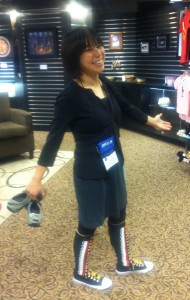”I firmly believe that every Indian tribe, regardless of size, must make a commitment to preserving and promoting its own cultural information by fully supporting tribally-controlled archives, libraries and museums. It is imperative that the unique and critical body of knowledge be gathered in a central location where access and use can be determined by the tribal community.”
-Walter Echo-Hawk
Honorary Chair, Association of Tribal Archives, Libraries and Museums
International Conference of Indigenous Archives, Libraries and Museums
June 5, 2012
From June 5-8, 2012, Robin Amado ’13, Omar Poler ’10 and I (Dawn Wing ’13) had the privilege of participating in the International Conference of Indigenous Archives, Libraries and Museums held at the Hard Rock Hotel and Casino in Tulsa, OK. Connecting with experienced tribal librarians from Canada, Australia and all parts of the United States, we gained deeper insights into best practices for indigenous knowledge organization, cultural preservation and outreach services. We were touched by the heartfelt opening ceremony to the conference on June 5th when tribal representatives of Oklahoma’s 37 tribes marched on stage with their respective banners and were a part of a traditional Cherokee blessing ritual.
In his speech during the ceremony, Walter Echo-Hawk, Honorary Chair of the Association of Tribal Archives, Libraries and Museums reminded the audience about the United Nation’s approval of the Declaration on Rights of Indigenous Peoples. Echo-Hawk reminded us of our responsibilities as information professionals to actively create culturally appropriate access and use of tribal resources through community building and respecting indigenous protocols.
During our luncheons, conference participants had the fortunate opportunity to learn of the innovations inspiring tribal leaders had created to overcome challenges in cultural preservation and indigenous education.
One such leader was Sven Haakanson, 2012 ATALM Leadership Award winner and Exective Director of the Alutilq Museum in Kodiak Alaska. Mr. Haakanson delivered an unforgettable message of the importance in confronting the painful truth of colonization yet also overcoming legacies of cultural genocide by conducting research and reproducing traditional items to educate tribal communities of their heritage. For Outstanding Project Ward, the Plateau People’s Web Portal (http://libarts.wsu.edu/plateaucenter/portal ) of Washington State University was recognized for its collaboration with tribal communities to curate and include their own knowledge of digital materials for various collections. It serves as a model for other university repositories to engage with tribal communities to enhance collections with indigenous histories and voices.
Joining Rita Lara, director of the Oneida Museum in Wisconsin, we presented on our tribal community engagement experiences in a session titled “Convening Culture Keepers: Establishing Regional Networks.” Highlighting the importance of relationship building and resource sharing to strengthen access and use of culturally significant information among Wisconsin’s tribes, we discussed the founding, philosophy and service learning components of UW-Madison’s Tribal Archives, Libraries and Museums (TLAM) course. LIS professionals attending our session provided enthusiastic feedback and expressed hopes and aspirations for TLAM’s expanding impact across Wisconsin and beyond.
Not only did Omar, Robin and I have the honor of presenting a session, we also enjoyed attending various panel discussions ranging from tribal library advocacy, archival protocols and copyright issues. Robin and Omar attended workshops relating to Institute of Museums and Library Services funding for tribal library programming and outreach and advocacy panels like the one presented by Sandy Littletree of Knowledge River, AZ. With my background and interest in ethics and repatriation in archival practices of tribal materials, I attended sessions presented by National Museum the American Indian Archive’s Head Archivist Jennifer O’Neal and Sealaska Heritage Center’s Tribal Archivist, Zachary Jones.
From these educational sessions, we developed a better understanding of the conflicts tribal communities and non-tribal cultural institutions face when values in cultural preservation and information access differ. Equally important, presenters provided concrete models for both tribal and non-tribal libraries and cultural institutions to address issues in tribal sovereignty, repatriation, representation, outreach services and finding funding to sustain professional development and relationship building for tribal librarians.
On an exciting personal and final note, I connected with Northeastern State University librarian Delores Titchywy Sumner who enthusiastically encouraged me to acquire these special contemporary pair of tribal shoes (in photograph) made for sale by Elizabeth “Betts” Doxtater of the Mohawk-Six Nations.
-Dawn Wing


Nice report. Perhaps see you in NM for 2013.